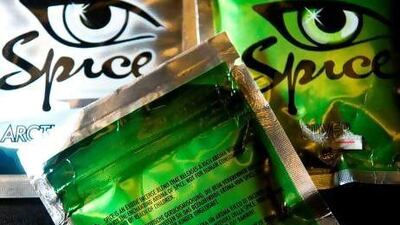DUBAI // British teenagers have been warned to steer clear of a synthetic cannabis product that was recently banned in the UAE.
All UK curriculum schools received a circular from the British embassy yesterday, warning them about the rising number of arrests related to a drug known to police as Spice, but most popularly referred to by teenagers as K2.
“From July 1, the drug called Space, Spice or K2 has been confirmed as an illegal substance in the UAE,” read the circular sent by Mandy Smith, the vice consul of the British Embassy in Dubai.
“I should perhaps tell you that on the first day we had 35 British nationals arrested and detained. It has escalated from there.
“The Dubai Police have been relentless in arresting citizens throughout the UAE and are ‘determined’ to prevent the usage of the drug in their country.”
The circular says the consequences of being caught with the drug are a four year sentence followed by deportation. Anyone caught selling the drug could face up to 15 years in prison.
“I had a meeting at the public prosecutors’ office and they have informed us that they will make examples of anyone caught. That includes young adults.”
Ms Smith said their research suggested the drug was widely used in schools across the UAE and there were students buying and supplying to others, too.
Head teachers at British schools in the emirate said they had forwarded the details on to parents.
Clive Pierrepont, director of communications at Taaleem, said their schools would intensify the anti-drug messages to pupils.
“The circular from the embassy mentions a very strict clampdown on people caught with this drug,” said Mr Pierrepont. “Pupils need to understand that this not only affects them but their family as well.”
Fiona Cottam, principal of Jumeirah College, said the advice would be added as a link in parent emails they sent out late on Monday.
“We have not come across any drug related incident inside the school campus yet,” said Ms Cottam. “But a lot of the issues with young people happen outside school. We need to make sure we reach them with the right information so that they make educated choices.”
Mr Pierrepont said their schools were careful to ensure the awareness campaigns they run avoid glamorising the drug.
“Our schools cater to different nationalities and children of different age groups,” he said. “So each school has to deliver a slightly different message on the harm of the drug and highlight the legal repercussions.”
Every parent worries about their child being pressured into bad decisions, said Niloofer Rouhani, who has two children in enrolled at an international school in Dubai. “But if parents and schools work together to instil values of honesty and integrity then they will be able to make the right decision,” she said.
“I always give my children the example of a good fruit that begins to rot when put in with the other bad fruits.
“Children should be taught to stay away from people who do not have their best interest in mind.”
She suggests schools hold more awareness sessions for the parents. “I think parents need to be educated about spotting such trouble, what to prevent and how to address such issues.”
Spice was available in the UAE for two years before it was banned. The higher narcotic drug review committee first recommended Sprice be banned in late March, and the first court case involving Spice began in July, when an Asian man was prosecuted for possession and use of the drug.
The trial is still under way.
aahmed@thenational.ae

